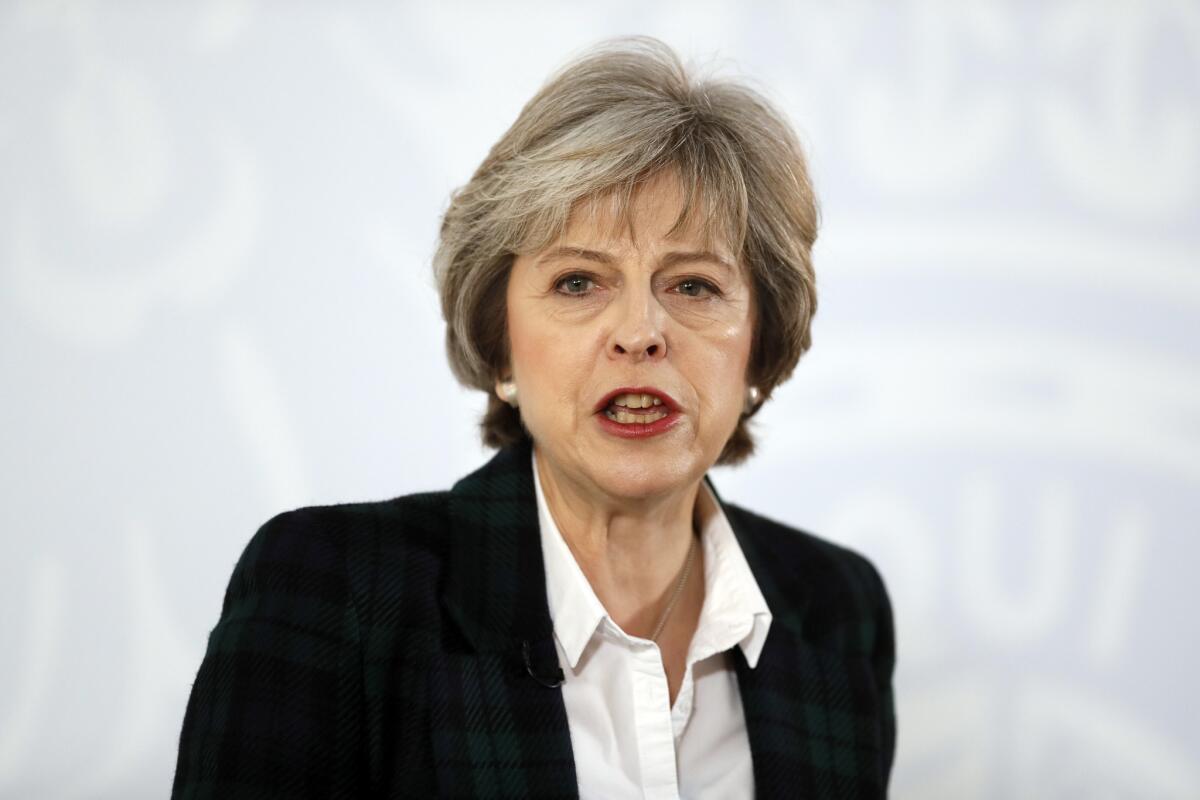British Prime Minister May lays out plans for a ‘stronger, fairer, more united’ country after ‘Brexit’

Reporting from London — British Prime Minister Theresa May on Tuesday set out her vision for Britain’s withdrawal from the European Union, declaring that there would be no “half in, half out” deal.
May pledged to create global alliances and a prosperous country for all, while saying that the British public voted for change in the June referendum and that was precisely what she planned to deliver.
“I want this United Kingdom to emerge from this episode of change stronger, fairer, more united and more outward looking than ever before,” she said. “They voted to leave the European Union and embrace the world.”
The speech emphasized Britain’s standing not just in Europe but the world, repeatedly using the phrase “Global Britain” and saying this vote — which has colloquially become known as “Brexit” — was not about the country looking inward, but outward to new deals and partnerships.
May said Britain would withdraw from the European single market, which is a central founding principle of the 28-nation bloc guaranteeing the free movement of goods, capital, services and people.
The move was necessary for Britain to regain complete control of its immigration policy and laws, thereby ending the jurisdiction of the European Court.
“I want to be clear. What I’m proposing cannot mean membership of the single market,” she said.
May also confirmed that Parliament would get a vote on the final terms of the deal, something that many lawmakers have been calling for repeatedly.
That decision was well received by the markets, which rose more than 2% during the address, a vast improvement from Monday, when the pound sterling slumped to a 31-year low against the dollar, to $1.20, amid uncertainty ahead of the speech.
However, new figures also show that inflation rose sharply to 1.6% in December, the highest since July 2014.
The speech was delivered at Lancaster House, a symbolic building in central London that has hosted international summits throughout the 20th and 21st centuries.
May spoke in front of members of the London diplomatic corps as well as ambassadors and high commissioners from other countries who are based in Britain and the team who will lead the United Kingdom’s negotiating efforts as it seeks to extricate itself from the more than four-decade-old union.
World leaders, especially European heads of state, also tuned in, eager to try to understand more about Britain’s forthcoming negotiating strategy.
May emphasized that Britain’s decision to leave the EU was not born of a desire to harm the union or see it collapse, nor a rejection of the EU’s values or a desire to be distant friends.
Rather, it was about Britain’s strong wish for autonomy and self-determination.
“We do not want to undermine the single market and we do not want to undermine the European Union,” she said. “It is overwhelmingly and compellingly in Britain’s national interests that the EU should succeed.”
German Foreign Minister Frank-Walter Steinmeier said the speech added “a little bit more clarity about the British plans,” and he welcomed May’s calls for a close and constructive partnership with the EU.
Britain’s Liberal Democrat leader, Tim Fallon, however, described the plans as a “theft of democracy,” arguing that complete withdrawal from the single market — which has been dubbed “hard Brexit” — was never on the ballot.
May said she would seek to have some form of customs agreement with the EU, but was open-minded about what form it would take. Britain must remain free to strike trade deals elsewhere with countries such as China, the Persian Gulf states, Australia and the U.S., she said.
The EU’s customs union guarantees tariff-free trade within Europe but limits the ability of its members to negotiate individual trade deals with non-European countries.
The speech was set out as a 12-point plan aimed at providing certainty to businesses and the wider public.
She tried to strike an optimistic tone and spoke of “anticipating success” rather than “expecting failure,” but also gave a stern word of warning to any of the remaining 27 EU members who sought to retaliate against Britain for voting to leave.
“I know there are some voices calling for a punitive deal that punishes Britain and discourages other countries from taking the same path,” she said. “That would be an act of calamitous self-harm for the countries of Europe. And it would not be the act of a friend.”
“No deal for Britain is better than a bad deal for Britain,” she said.
May has said she plans to trigger Article 50 of the Lisbon Treaty — the formal process that will begin the two-year withdrawal — by the end of March. That would see Britain formally leave the European Union around summer 2019.
In her parting comments, she also sought to bring together a country that has been deeply divided ever since the June 23 referendum, when about 52% of voters favored leaving the EU.
“When future generations look back at this time, they will judge us not only by the decision that we made, but by what we made of that decision,” she said. “They will see that we shaped them a brighter future. They will know that we built them a better Britain.”
Boyle is a special correspondent.
ALSO
Search for missing Malaysian Airlines Flight 370 ends after nearly 3 years
Music festival in Mexico turns tragic as gunman leaves at least five dead, 15 injured
As parliament bickers and brawls, Turkey’s Erdogan could be on the cusp of claiming vast new powers
UPDATES:
11:35 a.m.: This article has been updated with Times reporting.
5:49 a.m.: Updated with additional quotes from the speech and background
This story was originally posted at 5 a.m.
More to Read
Sign up for Essential California
The most important California stories and recommendations in your inbox every morning.
You may occasionally receive promotional content from the Los Angeles Times.










